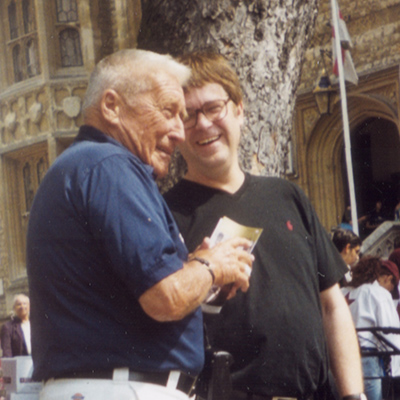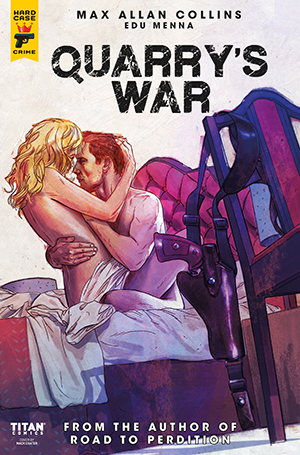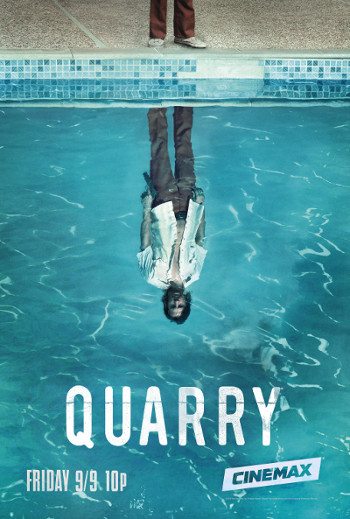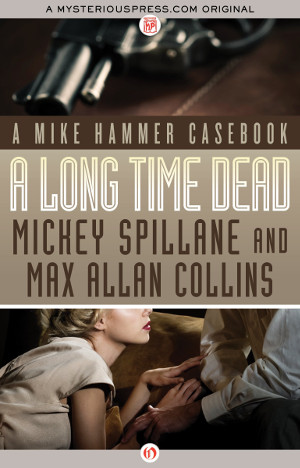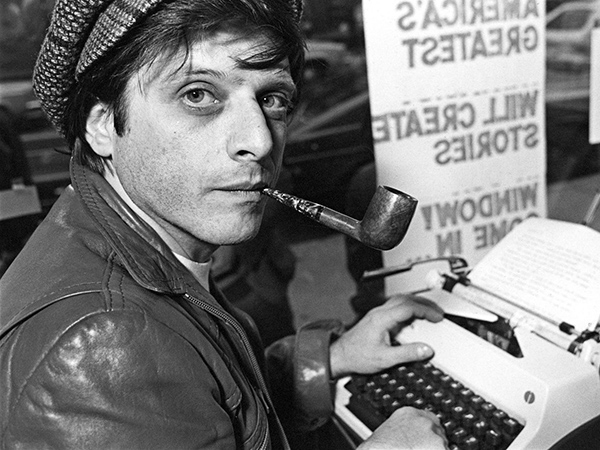
So Harlan Ellison is gone. Not dead, because his work will survive. He may not maintain the presence in the popular culture he once had, because he was chiefly a short story writer. Still, he might overcome that, because after all Edgar Allan Poe and Ray Bradbury were both chiefly short story writers, and they endure. Hard to imagine “I Have No Mouth, and I Must Scream” disappearing.
In the aftermath of Harlan’s passing, amid expressions of friendship and loss, came those who figured that while the body hadn’t cooled yet, it would be a good time to say that he was overrated and a “gasbag,” as one dweller in the dingy, dreary corners of Facebook put it. These nonentities who must disparage those who have actually contributed will be with us always –- perhaps more shrilly now, in the age of Trump and Social Media.
In my formative years – adolescence and teens – I read mostly crime/mystery writers. I followed only a handful of science-fiction authors, despite a love of comics, films and TV shows in that genre; among those authors were Bradbury and Ellison. I was particularly attracted by Ellison’s introductory material to his short story collections – I found it fascinating and exciting for the writer to come out from in back of his tales. To be a presence.
There’s no question that he influenced me in that regard. I talk about my work in that same way, if not with as much personality or gift for language; but I do it here, and have introduced many of the reprints of my work and the collections of shorter material.
I also enjoyed his fiction itself, very much, and was aware of his byline on TV scripts on such shows as Burke’s Law, The Outer Limits and Star Trek. Seeing his name on the screenwriter credit of a TV episode always made me sit up. And in my college years I loved his writing about TV, which covered his own experiences in the medium as well as unbridled reviews of various series (collected in The Glass Teat).
I met him in 1973 at a comics convention in Dallas, which happened to be the first such convention I ever attended. Knowing he was the guest of honor, I spotted Ellison in the dealer’s room on the first evening of the show and introduced myself, and told him my first two books had just been published (Bait Money and Blood Money). He congratulated me and asked me to accompany him as he took a stroll around the dealer’s room. He was friendly to me, even warm. Of course, I’d made it clear I was a fan and had brought a book along for him to sign.
Anyway, I accompanied him on his circuit around the room. About half a dozen times, dealers at the show took pot shots at him – picked verbal fights with him (I don’t remember the specific subjects), but were beyond rude. It was like walking down a street in the Old West with Billy the Kid and seeing various punks try to goad him into a shoot-out.
Harlan was soft-spoken, just nodded, said very little to them when he said anything at all. I was confused, knowing Harlan’s reputation for confrontation and not suffering fools. I told Barb about it in our hotel room, not sure whether I was impressed or disappointed.
Throughout the weekend I would stop and chat with Harlan, but we didn’t share a meal or head to a bar or anything – we were just friendly ships that had passed in the night. At the banquet on the final night of the con, with all the dealers and the other guests and many attendees present, Harlan was the scheduled speaker.
I said to Barb, as we sat and dined on rubber chicken, looking around at those who’d verbally assaulted the guest of honor earlier, “How I wish Harlan would take these sons of bitches on.”
And that’s what he did.
Harlan had noted the names of every face that insulted him on that tour of the dealer’s room, and in his keynote speech he reported their rude conduct and called them out individually. Told them it was a hell of a way to treat their guest of honor. And he shot each one of them down, leaving each writhing in a pool of embarrassment.
And I loved it. And I loved him for it, fan of revenge that I am.
A few years later, at a San Diego con, Harlan was going into a ballroom for a panel, accompanied by reps of the con. I paused, gave him a smile and a little wave, not thinking he’d even remember me. Then he called out, “Al! I can’t talk to you right now! We’ll get together later!”
We didn’t. I don’t believe we ever met face to face again, but over the years the damnedest thing happened: out of the blue he would call me. He treated me as if I were one of his closest friends, and as the years and these lovely sporadic calls kept coming, I began to feel that way myself. He made it clear he liked my work and that was extremely gratifying – little in a writer’s life is better than being admired by one of your favorite writers, particularly one who was a formative influence.
We did not agree on Mickey Spillane. He had a low opinion of Mickey typical coming from a progressive writer of his era. But he knew I loved Mickey and his work and he respected that.
One afternoon in my office at home I got a call from Harlan. Mickey’s The Killing Man, his first Mike Hammer in some time, had just come out.
“Al! Did you write this?”
“No. I’ve never ghosted Mickey. That’s his work.”
“Great! Now I don’t have to read it.”
He hung up.
Later he revealed to me that he had a standing order at his regular bookshop to set aside any novel of mine that came out. Only once did he criticize me.
“Al, stop using, ‘He shook his head no.’ Shaking your head is no.”
“Not all shakes of the head mean no, Harlan.”
“Fine. Then characterize those head shakes that way. Otherwise, it’s no!”
“Okay,” I said. “You sold me.”
“And can you watch your word repetition closer, please? You’re a better writer than that.”
Most good fiction writers try to avoid repeating words in the same paragraph or even on the same page (excluding articles like “a” and “the,” of course, and character names). Barb catches most of mine on her edits.
So I said to Harlan, “I admit I do that more often than I should. I try to catch them. But Harlan, a lot of words fly out of here in a year, and sometimes I slip. I’m trying to make a living.”
“Okay,” he said. “I can accept that.”
He was always gracious to me, friendly and funny, and very frank. His anecdotes about Hollywood, frequently ending with him trying to strangle an executive, were priceless. But a year or so ago, he confided that his failing health was something he wasn’t sure he could live with. He said sometimes he contemplated the choice Hemingway had made.
“Don’t do that,” I said, as if he were using too much salt on his food. “Hemingway taking his life colored his work forever. You don’t want that following you around after you’re gone.”
He allowed this was probably good advice.
I was troubled by his admission, but touched that he’d share something like that with me. Yet wasn’t that what had attracted me so as a teenager? This writer who came out from behind his fiction to confront you with his humanity?
And yours?
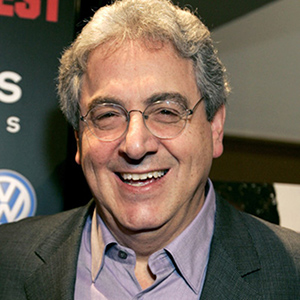
Lately I’ve read a number of books about improv comedy and Second City. If you follow these updates regularly at all, you know that I am a huge SCTV fan. When there was an SCTV reunion in 2009, as part of a 50th anniversary Second City celebration, Barb and I spent big bucks to attend the show, which included Joe Flaherty, Eugene Levy, Andrea Martin, Catherine O’Hara, Martin Short and Dave Thomas on stage together. Ramis performed with them, and also directed the performance. He had been a cast member the first season and head writer the second.
I embarrassed myself thoroughly bugging and fawning over any SCTV cast members I happened to encounter, and that was most of them. Why Barb remained married to me after such unconscionable fan boy behavior, I have no idea. But I was a teenage girl in 1964 talking to the Beatles – that bad. Maybe worse.
I’d met Ramis a few years before at a film festival in Chicago. That time I behaved myself, pretty much, getting introduced to him by a mutual friend. He was very gracious, quiet but nice, and he smiled when I mentioned how far I went back with him – to Swami Bananananda and kid show host Ol’ Muley (“These are the worst drawings yet, boys and girls”). We also talked about Stuart Saves the World, his Stuart Smalley movie with Al Franken; I told him how much I liked the film and that I wished it were out on DVD (later it was).
At Second City, though, I first flagged Ramis down the night of the reunion show and tried to remind him that we’d met (I don’t think he remembered) but he was friendly and expressed concern that they hadn’t had enough rehearsal time. He gave me an autograph, as well (I was on the hunt).
Throughout the weekend, I saw him a number of times, basically saying “The reunion was great” and hello, but it must have seemed to him that I was everywhere, maybe even stalking him (I wasn’t – it was sheer coincidence). Finally I caught him alone for a moment and apologized for bugging him (even as I bugged him again) and rather desperately said, “I just wanted to let you know how much I love Groundhog Day. It’s one of my favorite movies and it’s my son’s favorite movie, period. It’s a great, great film, it’s like…It’s a Wonderful Life.”
“It is,” he said with an enigmatic smile. “It is a wonderful life.”
I of course meant that his film Groundhog Day is on a level of importance with Capra’s It’s a Wonderful Life. But I am still not sure if he was agreeing with me, or saying his film was a variation on that film, or maybe just that…it’s a wonderful life. As in, it’s wonderful being alive.
I’m still thinking about that ambiguous reply, particularly now that I know a year later he would contract autoimmune inflammatory vasculitis, and be gone in 2014.
The books I’ve read recently about this remarkable actor, writer and filmmaker include Caddyshack: The Making of a Hollywood Cinderella Story by Chris Nashawaty, and Ghostbuster’s Daughter: Life with My Dad, Harold Ramis by Violet Ramis Stiel. The former is fascinating and covers the birth of The National Lampoon, Saturday Night Live and (to a lesser extent) SCTV, with the Caddyshack material starting about midway. It gives a good picture of Ramis at that important time of his life.
His daughter’s book I admit having some problems with, but I would still recommend it to fans of her dad. The book is her memoir, and only really interested me when it was dealing with Harold Ramis himself, although it did that frankly and with insight.
Here’s a really nice review of the first issue of the Mike Hammer serialized graphic novel from Hard Case Crime Comics (and Titan).
Here’s another good one.
Finally, here’s a review of Quarry’s Vote.
M.A.C.
